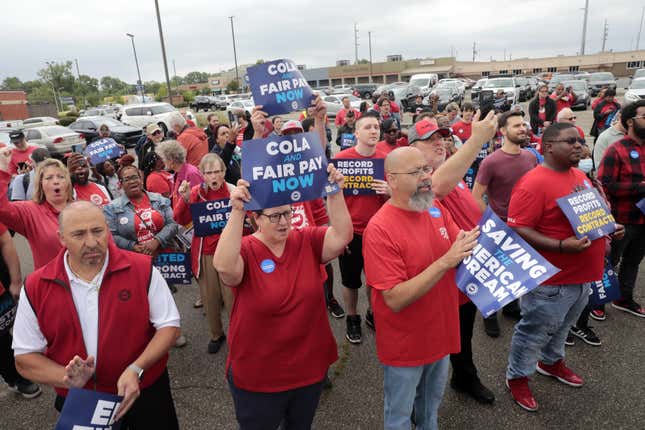United Auto Workers Union Votes To Authorize A Strike

Photo: Jeff Kowalsky/AFP (Getty Images)
The American auto industry is on the verge of what could be the largest strike in 50 years. The Big Three and the UAW have been unable to ratify a new contract that meets the demands of all parties involved, prompting the union to vote on strike authorization ahead of the current contract’s expiration. The votes have now been tallied, and 97 percent of union workers have voted yes — meaning the overwhelming majority of the UAW is ready to strike. And it could begin as soon as September 15 unless Ford, GM and Chrysler can offer an acceptable agreement.
Workers are are reportedly asking for cost-of-living adjustments, which were suspended in 2007 when the American public bailed out the auto giants amid the Great Recession. The “COLA” adjustments (as UAW workers refer to them) date back to the ’50s. These are guaranteed raises matching the rate of inflation in the U.S., which are meant to maintain parity between worker pay and their living expenses.
Adjusting for inflation, workers hired in 2023 make $10 less than workers who were hired in 2007, according to statistics cited by More Perfect Union.
The Big Three told workers they could no longer afford to keep up with inflation — at least, not during the recovery period needed to get the U.S. auto industry back on track. It’s been 16 years since then, and COLA adjustments have yet to materialize despite record profits for the industry and record bonuses going to Ford, GM and Chyrsler executives.
Workers are also demanding an end to the tiered worker system, another relic of the Great Recession that allows automakers to pay employees different wages for doing the same work depending on when they were hired. Workers also say that there are now less (or no) full-time workers on assembly lines, as automakers much prefer to bring on so-called supplemental workers. This “temp worker” category lets automakers legally get away with not extending full-time benefits, such as competitive healthcare and full retirement pay.
Now that the union has authorized a possible strike, the onus is on automakers to return to the bargaining table in good faith with an offer the UAW’s 150,000 workers deem satisfactory. Either that or suffer one of the biggest strikes in the U.S. in the last half-century.

Photo: Jeff Kowalsky/Bloomberg (Getty Images)







